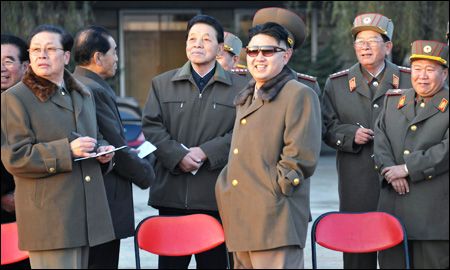
With the presidential candidates entering the homestretch before the Dec. 19 election, promises come hard and fast, even when it comes to the most unpredictable variable, North Korea.
The three candidates have each expressed interest in reengaging with Pyongyang following a dearth of talks under the Lee Myung-bak administration, during whose term the North waged two deadly attacks and China greatly boosted its economic influence over its communist ally.
But their approaches leave room for questions, watchers say.
Conservative Park Geun-hye wants to take a cautious step forward from Lee, opening some level of dialogue with the Kim Jong-un regime to test its true intentions, while maintaining a “robust” defense posture.
She proposes economic projects such as reconnecting the Trans-Korean railway as a “means of building trust on vital security matters.”
Observers point out however, that it is debatable whether Kim has cemented his grip over the military.
“It is unlikely for North Korea to play the game, because the ultimate aim of the trust-building is to reduce military tension,” Bong Young-shik, an analyst with the Asan Institute for Policy Studies said. “But we don’t know how capable and willing, how confident it is of dealing with such issues.”
Analysts say the North Korean regime has stabilized following the death of longtime despot Kim Jong-il late last year and that it is pushing forward with plans to modernize its economy. But reports last month that the regime was purging military officials raised questions over the loyalty of the military.
On the other end of the spectrum, Moon Jae-in is the most proactive of the candidates on the North, hoping to create an inter-Korean “economic confederation” to move towards an eventual reunification of the two Koreas. He proposes to work toward a peace treaty to end the (1950-53) Korean War.
Moon and liberal independent Ahn Cheol-soo vow to staunchly defend the Northern Limit Line (NLL), the military demarcation line that the North protests.
But Pyongyang insists the line be redrawn in accordance with international law during peacetime. Moon’s push for a peace treaty, critics argue, could bring the North’s argument to redraw the line into play.
Ahn, who also advocates proactive engagement, has said he would establish a direct hotline between the military commands responsible for the area on both sides of the NLL and, after both sides accept the existing line, begin talks to forge a joint fishing zone near the flashpoint border.
The proposal came under attack from conservatives who said Pyongyang has not shown interest in accepting the line.
Watchers say that the candidate’s goals, though they appear serious, are likely to be tempered once the winner enters office because he or she will have to deal with a host of variables from coordination with Washington to Pyongyang’s reaction to any overtures. <The Korea Times/Kim Young-jin>




